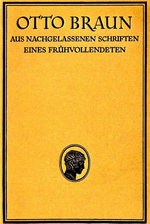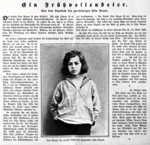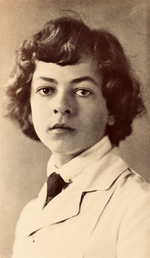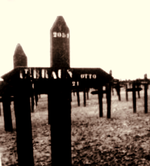Otto Braun (poet)

Otto Braun (born June 27, 1897 in Zehlendorf near Berlin ; † April 29, 1918 with Marcelcave , Somme department , France ) was a German poet . During his lifetime, only one poem was published in a magazine without his knowledge and consent. After the First World War, however, his works were published posthumously in Germany, Great Britain and the United States and were quite popular, even a bestseller in Germany. He was praised by authors such as Rudolf Borchardt , Hugo von Hofmannsthal and Rudolf Alexander Schröder .
Life

The only son of the journalist, writer and social democratic women's rights activist Lily Braun and the social democratic politician and publicist Heinrich Braun was considered a “child prodigy” and adored the poet Stefan George . He was very introverted and, even as a young boy, stood out for his extraordinary literacy. This gave adult contemporaries the impression of “presumptuous precociousness”. He suffered from mood swings, isolated himself from his classmates and took refuge in solitude, where he developed poems as well as fantasies.
After attending school in Berlin for the first time, from April 1907 to the end of September 1908 he attended the reformed educational rural education home Freie Schulgemeinde in Wickersdorf near Saalfeld in the Thuringian Forest , where he befriended his classmate Otto Gründler three and a half years older . During this boarding school stay, he got into the smoldering conflict between school principal Paul Geheeb and the spiritus rector of the country school home, Gustav Wyneken . The everyday tensions that arose as a result bothered the eleven-year-old. When he joined Geheeb's position, Wyneken viewed him as an opponent and treated him accordingly. On February 6, 1908, he characterized Wyneken in a letter to his mother as the "embodiment of all intrigues". He also reported that Wyneken picks certain favorites among the male students he prefers.
The lack of time and rest for self-study seemed unbearable to him. On September 2, 1908, he wrote to his mother: “I just don't get into a good mood, because it can only be brought about by immersing myself in me or you. But there is no time for that. […] Now I have a very strange feeling that I've never had. I don't feel at home in Wickersdorf. I swear to you, with everything that is sacred to us, with everything that is beautiful and good, with everything that is true in the world, that this feeling is not created because I wanted to go to Berlin. I have it, now there is no help. It is of course mainly a feeling, but there is also a reason: W. [Wyneken] gave a speech about the Wickersdorf worldview the day before yesterday at the foundation festival. Something has changed, either I have changed or the others; i think i have changed […] And one more thing: I cannot strengthen my will and my character here ”.
In the same month he made an attempt to escape from the boarding school, which ended at the train station in Saalfeld. This alarm signal reached his parents, who then released him and de-registered him from the free school community . Lily Braun picked up her son personally from there. In Spandau near Berlin , he first attended the Royal High School before he was finally taught by private tutors.
His parents and teachers thought he was gifted. That is why Joseph Petzoldt , who had a doctorate and habilitation , a senior teacher at the Royal High School in Spandau and a private lecturer at the Technical University of Charlottenburg , author of the text Special Schools for Exceptionally Capable People , applied to the Royal Ministry for Spiritual, Educational and Medical Matters from the teaching service on December 8, 1909 partially exempted and to be entrusted with the private lessons of the then twelve year old student. Petzoldt personally convinced himself through several hours of conversations and careful reading of several of Braun's works, "[...] that his talent has not been overestimated in any way, indeed that it is quite astonishing and wonderful." He reported that Otto Braun had already learned Middle High German , in order to be able to read the Germanic hero songs in the original, and for the sake of the pre-Socratics in Greek. Petzoldt's application met with incomprehension from the authorities and was rejected on March 17, 1910.
As a child, Otto Braun frequented the house of the painter and Salonnière Sabine Lepsius and her husband, the impressionist portrait painter Reinhold Lepsius , which gave him access to the George Circle in Berlin . Like his mother Lily, both were friends with Käthe Kollwitz . Lily Braun exchanged ideas with Käthe Kollwitz about her own and her two sons Hans and Peter . Together with the same age Stefan Lepsius (1897-1917), who owed his first name to the admiration of Stefan Georges, he was privately tutored by Herman Schmalenbach . In July 1914, in Heidelberg, he got in touch with the sociologist and economist Alfred Weber and his students, as well as with the economist and writer Elisabeth Salomon , who later became the wife of Friedrich Gundolf .
After August 1, 1914, the declaration of war of the German Empire was done, he enlisted as a 17-year-old in September 1914 as a volunteer . As a messenger rider with the replacement squadron of the Jäger-Regiment on Horses No. 4 , which the XVII. Army Corps was subordinate to the 8th Army , the Fahnenjunker was initially deployed on the Eastern Front in Poland. There he wrote in his diary in the trenches in 1915: “It's just so wonderfully beautiful, beautiful, beautiful, despite the horrific thing I just saw here”. He underlined the adjective "beautiful" repeated three times. On August 5, 1915, he wrote to his parents in a field post letter : “At eight o'clock we moved into Warsaw with the division. It was an intoxication that cannot be said ”. On August 13, 1915, he reported to his parents: “What experience I have gained in every respect in this short period of real war! I notice that certain important aspects of the human being can only be seen obviously in the fire, there a lot falls away and strange things arise ”. Later he was also deployed to the front in Italy and Alsace .
After a serious wound to his arm in 1916, he worked for about a year in the military office of the Foreign Office . He also attended an officer training course in Döberitz . During this time Braun was in contact with the authors Rudolf Borchardt and Friedrich Gundolf. Borchardt subsequently became Braun's mentor, to whom he also submitted his early literary works for review and assessment. Braun fell one-sidedly in love with the Berlin dancer and actress Katta Stern , a niece of Käthe Kollwitz, but Borchardt finally managed, during a heated conversation, to dissuade Braun from this unsuccessful love affair, because she was in a relationship with Ernst Mátray .
From November 13th to December 12th, 1917 Otto Braun was accommodated in the hospital in Schloss Neubänen at the mediation of Lieutenant Colonel Herwarth von Bittenfeld , where he entered the guest book that has been preserved. There he met Hélène Johanna Rosina "Puppie" van de Velde (1899–1935), the daughter of the Belgian architect and designer Henry van de Velde , who lives in Weimar, by chance from November 13 to 16, 1917 . Around ten years earlier, she was his classmate in the Wickersdorf Free School Community . When he met Karin (1898–1920) in the castle, the daughter of the art historian and entrepreneur Eberhard von Bodenhausen , who was considered to be emotionally unstable in her own family , he was impressed by her and fell in love. Their father was the brother-in-law of the castle mistress Julie Freifrau von Wendelstadt (1871–1942), née Countess Degenfeld-Schonburg . In order to get Karin close to his family, he tried to place her through his father as a nurse in the Oskar-Helene-Heim in Dahlem near Berlin. In December 1917, however, he had to realize that Karin von Bodenhausen had only played with him and described this soberly in a two-trophic poem.
At the end of 1917, after a renewed declaration of his suitability for use in the war, which is hardly understandable from today's medical point of view given the severity of his wound, he was deployed on the Western Front from February 1918 , where he was a 20-year-old lieutenant and orderly officer together with five comrades from his 1st Company of Reserve Jäger Battalion No. 21 fell in a shelter when it was hit by a shell .
obituary

Otto Braun was buried in the German military cemetery near Bayonvillers in the Somme department , but was later reburied. Since then he has been resting by his mother Lily's side. The grave was set up on the former family estate at Erlenweg 29 in Zehlendorf near Berlin; today it belongs to Kleinmachnow . Since the formerly extensive property has since been parceled out, the grave and grave monument are now on the neighboring property at Klausener Strasse 22 of the preserved and now restored Braun Villa.
Otto Braun's former mathematics teacher Kaempf dedicated an obituary to him: “Otto Braun attracted the attention of wide circles from an early age thanks to his rare talent and an astonishingly versatile mind. The fresh naturalness and youthful cheerfulness of his disposition made us expect a spiritually highly developed harmonious personality. One has to imagine the boy Goethe like him. "
After Braun's death, which became known, the Austrian writer Hugo von Hofmannsthal wrote : “Berlin, 11th V. 18. When I close the letter, [Rudolf] Borchardt's phone comes : the young Braun has fallen. It's horrible, these sacrifices to the very highest blossoms of our spiritual life, horrible, horrible, I am completely overturned by the death of this person to whom one has so much connection without knowing him and who wrote such fabulous, fabulous letters. Horrible, horrible ... "
After the end of the war , the later fourth wife of his father, Julie Braun-Vogelstein , published diary notes, letters, poems and scenes by Otto Braun under the title From the posthumous writings of an early completed man , which were also published in English in London and New York City. In 1969 Braun-Vogelstein also published the book Fragment der Zukunft. Notes from an early completed man with further diary notes and letters.
In Gustav Wyneken's estate in the archive of the German youth movement , a copy of Otto Braun's posthumous lyrical works and diaries published in 1919 was found. In it Wyneken commented in handwriting: “It is significant that so much fuss is being made about this book, it is excellently suited as a copy of mediocrity… You can turn to any page! GW "
Works
- Poems
- Eros and Psyche - five scenes
- Sigurd vom Walde (unpublished novel fragment)
literature

- Lily Braun: Memoirs of a Socialist. Years of apprenticeship, years of struggle , novel (= autobiography). A. Langen, Munich 1908. OCLC 715084329 With mother's foreword about Otto Braun.
- Julie Braun-Vogelstein: Otto Braun. From the posthumous writings of an early completed man . Bruno Cassirer Verlag, Berlin 1920. OCLC 639769761
- ders .: The diary of Otto Braun, with selections from his letters and poems . William Heinemann, London 1924. OCLC 557585650
- ders .: The diary of Otto Braun, with selections from his letters and poems . Alfred A. Knopf, New York City 1924. OCLC 391708
- Friedrich Georg Jünger : Otto Braun . In: Ernst Jünger (Ed.): The Unforgotten . J. Moser, Munich 1928, pp. 29-36. OCLC 20929357
- Dorothee Wierling : A family at war. Living, Dying and Writing 1914–1918 . Wallstein-Verlag, Göttingen 2013, ISBN 978-3-8353-1301-9 .
- Braun, Otto. In: Lexicon of German-Jewish Authors . Volume 3: Birk – Braun. Edited by the Bibliographia Judaica archive. Saur, Munich 1995, ISBN 3-598-22683-7 , pp. 437-438.
- René Gass: In the early death. The short life of the war volunteer Otto Braun (1897–1918) . Chronos, Zurich 2014. ISBN 978-3-0340-1229-4 .
- Sven Felix Kellerhoff : Home Front. The fall of the ideal world - Germany in the First World War . Bastei Lübbe, Cologne 2014, ISBN 978-3-8387-5621-9 .
exhibition
- Exhibition on Otto Braun , October 6th, 2018 to April 12th, 2019 in Schloss Neubänen ; Info sheet (PDF file; 7.1 MB)
Web links
- Literature by and about Otto Braun in the catalog of the German National Library
- Works by and about Otto Braun in the German Digital Library
- He was allowed to die in the sea of fire . Deutschlandfunk culture
- Otto Braun , Vatermoerder.de
Individual evidence
- ↑ In the foreword “To my son” of his mother Lily Braun's autobiography, published in 1908, Memoirs of a Socialist. Years of apprenticeship, years of struggle , June 24th is called Otto Braun's birthday: “On the solstice night that you gave me, on the solstice night when the fires glow all around on the heights, on the solstice night, where there arises something worthy of eternal life let the ghosts of the past be summoned first. Obergrainau, June 24th, 1908 ”. In the published list of casualties of Reserve Jäger Battalion No. 21, on the other hand, June 27 is recorded as the birthday.
- ↑ In the published list of casualties of Reserve Jäger Battalion No. 21, April 27, 1918 is recorded as the day of the death of Lieutenant Otto Braun (1st Company).
- ↑ Otto Braun's unauthorized published poem, Afternoon at the Bzura , was published in 1915 in the patriotic magazine Wieland , vol. 1, No. 24, September 10, 1915.
- ↑ a b c d Arno Orzessek : He was allowed to die in the sea of fire . In: Deutschlandfunk Kultur, February 13, 2014, at: deutschlandfunkkultur.de
- ↑ A precocious youth at the front . In: Die Welt , on: welt.de
- ^ Dorothee Wierling: A family at war. Living, Dying and Writing 1914–1918 . Wallstein-Verlag, Göttingen 2013. ISBN 978-3-8353-1301-9 , p. 17.
- ↑ a b Peter Dudek : “You are and will remain the old abstract ideologue!” The reform pedagogue Gustav Wyneken (1875–1864) - A biography . Verlag Julius Klinkhardt, Bad Heilbrunn 2017. ISBN 978-3781521766 , pp. 120-122.
- ↑ a b Directory of students of the Free School Community of Wickersdorf . In: Archives of the German youth movement , Ludwigstein Castle near Witzenhausen in Hesse.
- ^ Julie Braun-Vogelstein: Otto Braun. From the posthumous writings of an early completed man . Insel Verlag, Leipzig 1921, p. 21. OCLC 1050832192
- ↑ Bernd-Ulrich Hergemöller : Wyneken, Gustav . In: Volkmar Sigusch , Günter Grau (Hrsg.): Personal Lexicon of Sexual Research . Campus Verlag, Frankfurt am Main 2009, ISBN 978-3-5933-9049-9 , pp. 788-792 (citation: p. 790).
- ↑ Julie Braun-Vogelstein (Ed.): Otto Braun. From the posthumous writings of an early completed man . Insel Verlag, Leipzig 1921, p. 297. OCLC 1050832192
- ^ Julie Braun-Vogelstein: Otto Braun. From the posthumous writings of an early completed man . Insel Verlag, Leipzig 1921, p. 27f. OCLC 1050832192
- ↑ Peter Dudek: “You are and will remain the old abstract ideologue!” The reform pedagogue Gustav Wyneken (1875–1964). A biography . Julius Klinkhardt, 2017, ISBN 978-3-7815-2176-6 , pp. 119ff.
- ↑ Bernd-Ulrich Hergemöller, Nicolai Clarus: man for man. Biographical encyclopedia on the history of love for friends and male-male sexuality in the German-speaking area , part 1 (= social-scientific studies on homosexuality, edited by Rüdiger Lautmann ). LIT Verlag, Münster 2010, ISBN 978-3-6431-0693-3 , pp. 193, 1134, 1233, 1302.
- ^ Joseph Petzoldt: Special schools for excellently able . Teubner, Leipzig and Berlin 1905. (Reprint 2018: ISBN 978-0-3643-2257-4 )
- ^ Julie Braun-Vogelstein: Otto Braun. From the posthumous writings of an early completed man . Bruno Cassirer Verlag, Berlin 1920.
- ^ Yury Winterberg , Sonya Winterberg : Kollwitz. The biography . C. Bertelsmann, Munich 2015, ISBN 978-3-570-10202-2 , p. 90.
- ^ Sven Felix Kellerhoff : Home Front. The fall of the ideal world - Germany in the First World War . Bastei Lübbe, 2014, ISBN 978-3-8387-5621-9 .
- ↑ a b c George Yearbook , Volume 11, 2016/17. Walter de Gruyter, Berlin 2016, ISBN 978-3-1104-7833-4 , pp. 199-208.
- ^ Julie Braun-Vogelstein: Otto Braun. From the posthumous writings of an early completed man . Bruno Cassirer Verlag, Berlin 1920, pp. 144, 145.
- ↑ a b c Berliner Morgenpost of May 3, 1918. Quoted from Otto Braun. From the posthumous writings of an early completed man , ed. by Julie Braun-Vogelstein, Berlin 1919. OCLC 639769761
- ^ A b Obituary notice for Lieutenant Otto Braun, Knight of the Iron Cross, 2nd class, on behalf of the officer corps, v. Diepow, captain and commander of the Res.-Jäger-Bat. 21 . In: Vossische Zeitung , morning edition, May 7, 1918.
- ↑ a b c Peter Sprengel : Rudolf Borchardt: The Lord of Words . CH Beck, Munich 2015. ISBN 978-3-4066-8207-0 .
- ↑ Entry in the guest book of Schloss Neubeuert, Volume VI, from November 1917: “After 10 years, Puppie met an old Wickersdorfer, to do this you have to go to Neubeuert. It was nice! 23-26 November 2017, Puppie van de Velde "
- ^ Dorothee Wierling: A family at war. Living, Dying and Writing 1914–1918 . Wallstein-Verlag, Göttingen 2013. ISBN 978-3-8353-1301-9 , pp. 343-351.
- ^ Julie Braun-Vogelstein: Otto Braun. From the posthumous writings of an early completed man . Insel Verlag, Leipzig 1922, p. 239.
- ^ A b Peter Dudek: "Experimental field for a new youth" - The Free School Community of Wickersdorf 1906–1945 . Julius Klinkhardt, Bad Heilbrunn 2009, ISBN 978-3-7815-1681-6 , p. 184.
- ↑ SM Wennich (edit.): The Reserve Jäger Battalion No. 21 in the World War. Loss list . In: Denkmalprojekt, on: denkmalprojekt.org
- ^ Dorothee Wierling: A family at war. Living, Dying and Writing 1914–1918 . Wallstein-Verlag, Göttingen 2013, ISBN 978-3-8353-1301-9 , p. 371.
- ↑ Solveig Schuster: Lily Braun's grave in Kleinmachnow in danger. No more ghost for the grave in the garden . In: Potsdamer Latest News , June 29, 2016, at: pnn.de
- ^ Dora Freifrau von Bodenhausen (ed.): Eberhard von Bodenhausen. A life for art and business . Eugen Diederichs, Düsseldorf / Cologne 1955, pp. 333, 334. OCLC 906427064
- ↑ Julie Braun-Vogelstein: Fragment of the future. Notes of an early completion . Deutsche Verlags-Anstalt , Stuttgart 1969. OCLC 610434957
| personal data | |
|---|---|
| SURNAME | Braun, Otto |
| BRIEF DESCRIPTION | German lyric poet |
| DATE OF BIRTH | June 27, 1897 |
| PLACE OF BIRTH | Berlin |
| DATE OF DEATH | April 29, 1918 |
| Place of death | Marcelcave , Somme department , France |








